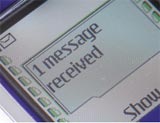
On Alert
George Mason University installs emergency communications portal
- By Megan Weadock
- Oct 02, 2008
 Students at Washington, D.C.’s prestigious
George Mason University
pass their years with plenty to
worry about.
Students at Washington, D.C.’s prestigious
George Mason University
pass their years with plenty to
worry about.
Margaret Adkins, a 2008 graduate of
the university’s law program, serves as a
good example of the busy George
Mason student. Over the course of the
three-year program, Adkins took up to
six classes a semester. She estimates that
she spent about six to 12 hours a week
per class studying.
Clearly, students like Adkins have
enough on their minds without having to
worry about security. But today, the safety
of university students is a paramount
concern. That’s why George Mason
recently installed a new emergency alert
solution on campus to back up its existing
communications systems.
Stepped-up Security
When planning for emergency situations,
universities must take into account possible
communication problems, such as
overloaded cell networks, as well as logistical
issues, including the ability to reach
everyone. George Mason addressed these
issues head-on by selecting ALERT FM, a
personal alert and messaging system, from
Global Security Systems, a system integrator,
service provider and manufacturer
of homeland security and natural disaster
systems headquartered in Jackson, Miss.
George Mason is the first university to
install the ALERT FM solution.
“George Mason already had SMS and
e-mail emergency notification in place,
but we were looking for multiple layers
due to the vulnerability of SMS and email,”
said Keith Bushey, George Mason
vice president of special projects. “The
ALERT FM system was affordable and
provided an infrastructure that was
already in place—taking a burden off of
us. We’re in total control—even down
to registering and programming the
receivers for the end user.”
ALERT FM enables state and local
government, universities and private
sector officials to create and send emergency
alerts and messages, such as tornado
warnings, homeland security
notices, hurricane evacuation instructions,
utility notices, plant or school
closings, employee notifications and
even traffic alerts. First responders,
school officials and citizens can receive
alerts and messages through ALERT FM
receivers or any device equipped with a
standard FM chip. More than 10 million
people in six states have access to
ALERT FM technology.
To further strengthen emergency communication
on the campus, George
Mason also purchased ALERT FM
receivers, USB receivers and wall
receivers. The ALERT FM receivers and
USB receivers are portable devices capable
of receiving emergency alerts and
messages. The ALERT FM wall receivers
are designed for stationary mount in public
locations, such as libraries, dorms or
classroom hallways.
Reliable and Redundant
George Mason is clearly an institution
that takes security seriously. Adkins, who
was signed up for the school’s SMS alert
service, said she was reassured to know
she would be notified immediately if anything
happened.
“I felt very secure,” she said. “I never
really thought about security, and there
were never any issues.”
And in the university’s continued
effort for security from all angles, the
new ALERT FM system fills in any gaps.
“The redundancy of the FM transmitters
chosen to broadcast ALERT FM messages
is what makes the system reliable
enough for use on a large college campus,”
said Jim Lowery, GSS general manager.
“It delivers messages using the data subcarrier
of local FM radio stations, and we
always choose a minimum of two local stations
in case there is an issue with the primary
station. Also, this technology is not
affected by telephone network capacity
issues or power outages, which might
occur during an emergency situation.”
Lowery explained that in an emergency
situation, George Mason security
officials would access ALERT FM via a
secure, Web-based portal to send an alert
or message. The portal allows authorized
administrators to create messages and
select what receivers should receive
them. Administrators can send urgent
messages, delivered in about six seconds,
or general messages, which can take up to
60 seconds to be delivered.
In the broad wake of the Virginia Tech
shootings last year, George Mason’s thorough
system will give students, staff and
professors peace of mind.
“A reliable and redundant emergency
communication system is essential for colleges
and universities,” Lowery said.
“Campus-wide notification has always
been a concern of university administrators
and security officials, but in recent
years, this concern has been elevated
based on high-profile events. The safety of
students, faculty and staff is a priority, and
campus-wide notification can help keep
these groups safe and informed.”
Expanded Applications
GSS continues to upgrade its emergency
communications solution. The company
recently added SMS and e-mail capabilities
to the ALERT FM system, giving
users multiple paths to mass notification.
This fall, Hinds Community College,
the largest community college in
Mississippi—with six campuses spread
over three counties—will become one of
the first colleges in the nation to use the
new SMS and e-mail capabilities, as well
as FM radio-based messages, to communicate
with its students, faculty and staff
during emergency situations.